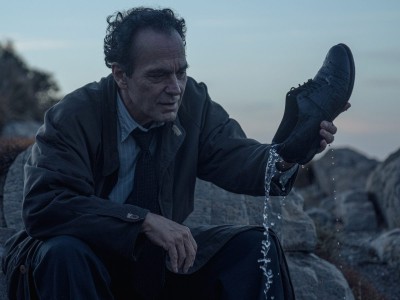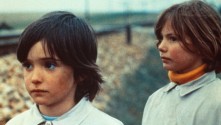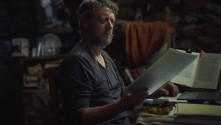
Close Your Eyes
(Cerrar los ojos)
With Manolo Solo, Jose Coronado, Ana Torrent.
Spain/Argentina, 2023, DCP, color, 165 min.
Spanish, Catalan, English, French and Chinese with English subtitles.
DCP source: Film Factory Entertainment
In Cerrar los ojos, a filmmaker was unable to finish his second film, entitled La mirada del adiós (The Goodbye Gaze). In the middle of filming, his lifelong friend and the main actor of the film disappeared. He is presumed dead, but his body has never been found. That happened in 1990. The story itself takes place in 2012, and the link between that almost forgotten misfortune and the present of Miguel Garay—now a translator, far from Madrid and the cinema, near the sea and to the south, in Granada—is brought back by a television program that returns to the unsolved case of Julio Arenas, the missing actor.
What happens after the airing of television program is a knot of secretly extraordinary situations, with singular characters. The story moves in only one direction, the possible reunion of the two friends. They are accompanied on this journey, at different moments by: an old film buff who guards the cans of the two reels of La mirada del adiós (which is seen at the beginning and at the end of Cerrar los ojos and which has obvious affinities with La promesa de Shanghái (The Promise of Shanghai), the film that Erice himself never managed to make); two nuns who love the people around them without reservations and who provide unexpected comedy; an Argentine pianist and singer, who was also the lover of both Miguel and Julio; three of Miguel's neighbors who take care of his dog and his garden when he is away, and who can invoke the happiness of being together by all singing a song from Río Bravo. They are all beautiful, even the host of the television show who is seriously concerned about Julio's whereabouts, and the benevolent nurse who also wants the best for a man whom everyone now calls Gardel, but who could really be that actor who abandoned the world.
It has been said that Cerrar los ojos is more narrative than Erice's previous films. To a certain extent, yes, but the pictorial dimension of many of his shots is hardly lacking. The last thirty minutes are imposed not only by the dramatic suspense inscribed in the script, but also by the behavior of the light in the shots and the laborious planning of the frames. ... He is faithful to Bresson’s idea of the cinema as discovery. Cinematography is more than just cinema. With light and sound, it is possible to transfigure the given world and replace something unmatched and in principle nonmimetic that can only be established through a camera. In fact, there are scenes that transcend their narrative function: observing the composition of the shot showing Gardel's bed that has been made, in the small room the nuns have provided for him in the home for the elderly where he works, is enough for us to witness what a filmmaker can achieve with a single image. There are several such shots. Is it necessary to point them all out? There is the one of the friends watching the sea behind a fence, and the one of the nun going to the room where Miguel is staying, and the one of the father and daughter sitting on a bench at night, in silence, and the one of the moment when the lights of the elderly home go out and the night returns us to the loneliness of those who live there. ... – from the introduction by Roger Koza











